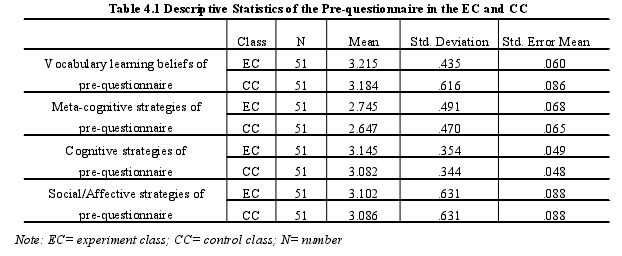联系方式
more本类最新英语论文
- 2024-04-28基于合作学习的思维导图在初..
- 2023-10-13汉语右移位构式的认知视角探..
- 2022-06-28语境丰富度和二语注释对英语..
- 2021-01-14移动学习模式在高中英语词汇..
- 2017-12-27基于语料库的高中英语词汇教..
- 2017-12-22叙事教学法指导下的高中英语..
- 2017-12-19蒙古族高中生的汉语水平对其..
- 2017-12-17英语词汇触发理论视域下的一..
- 2017-12-13英语专业学生专四写作中的词..
- 2017-12-12基于语料库的中国大学生汉英..
more热门文章
- 2015-06-17英语谚语俗大全(中英对照)
- 2010-02-10neat tricks of vocabulary..
- 2009-04-21英语新词汇的变化和发展
- 2009-12-15不定代词的关联理论和元语用..
- 2009-04-12 2008年英语专业论文题目推..
- 2010-03-01interpersonal meaning of ..
- 2010-02-08探讨词汇习得过程中的特点和..
- 2009-04-04英语新词汇研究
- 2010-06-25vocabulary is a key to en..
- 2009-04-12浅谈英语词汇的发展
more留学论文写作指导
- 2024-03-31卡森•麦卡勒斯小说中..
- 2024-03-28美国黑人女性心理创伤思考—..
- 2024-03-27乔治·艾略特《织工马南》中..
- 2024-03-21超越凝视:论《看不见的人》..
- 2024-03-19《哈克贝利•费恩历险..
- 2024-03-13心灵救赎之旅——从凯利的三..
- 2024-02-22文学地理学视角下的《印度之..
- 2023-05-03英、汉名词短语之形容词修饰..
- 2023-02-07目的论视域下5g—the futur..
- 2022-07-04二语英语和三语日语学习者的..
模因论在高中英语词汇教学中的应用研究 [3]
论文作者:www.51lunwen.org论文属性:硕士毕业论文 thesis登出时间:2017-08-03编辑:lgg点击率:6069
论文字数:38596论文编号:org201708022004542587语种:英语 English地区:中国价格:$ 66
摘要:本文是英语词汇学论文,本文基于模因论及其相关研究,提出所有已经存在的单词像自由词素,词缀,词根和其他的单词形式(粘着词素),以及词块,构词法和词汇学习策略都可以是词汇模因。

Chapter Three Research methodology.......26
3.1 Research questions........ 26
3.2 Research participants.....26
3.3 Research instruments.....27
3.3.1 Questionnaire.......27
3.3.2 Vocabulary test.... 29
3.3.3 Interview....30
3.3.4 SPSS 19.0............31
3.4 The procedures of the experiment.....31
3.5 Summary............. 45
Chapter Four Data analysis and discussion.........46
4.1 Analysis and discussion of the questionnaire........46
4.2 Analysis and discussion of the vocabulary test..... 50
4.3 Analysis and discussion of the interview.... 55
4.4 Summary............. 57
Chapter Five Conclusion......... 58
5.2 Implications.........60
5.3 Limitations...........60
5.4 Suggestions..........61
5.5 Summary............. 62
Chapter Four Data analysis and discussion
This chapter mainly aims to analyze and discuss the data collected by using the SPSS.First of all, the data of questionnaires will be analyzed and discussed. Then, the tests’ datacollected in the experiment will be described and analyzed, and the detail conclusionswill also given. At last, the data from the interview will be discussed. By analyzing allthese data, the research questions will be answered better.
4.1 Analysis and discussion of the questionnaire
As was stated in the third chapter, the questionnaire adopted is rather reliable butcomplex, each of whose items is designed the five choice. Especially, the questionnaire ismade up of four dimensions: vocabulary learning beliefs, meta-cognitive strategies,cognitive strategies and social/affective strategies. So the process of analysis anddiscussion of the questionnaire must cost much time and energy. This section focuses onanalyzing the pre- and post-questionnaire in detail, hoping to answer the first researchquestion of this paper.The purpose of the pre-questionnaire is to show whether the students’ vocabularylearning strategies in in EC and CC are similar before experiment, which can provide agreat foundation of performing experiment and be convenient to make a comparison withthe result of the post-questionnaire. The detailed data analysis is shown as follows:From the Table 4.1 and Table 4.2 above, the Descriptive Statistics and IndependentSample T-test of the pre-questionnaire in EC and CC can make a clear explanation that theEC and CC have no significant difference in the four dimensions before the experiment:the vocabulary learning beliefs of pre-questionnaire in EC and CC (t (100) = 0.297,p>0.05), the meta-cognitive strategies of pre-questionnaire in EC and CC (t (100) = 1.028,p>0.05), the cognitive strategies of pre-questionnaire in EC and CC (t (100) = 0.906,p>0.05) and the social/affective strategies of pre-questionnaire in EC and CC (t (100) =0.906, p>0.05).
..........
conclusion
Considering the implications and limitations of this paper, there are some furthersuggestions given for future research.First of all, the author suggests that the relevant studies should be for a prolonged timeso the experimental results can be more reliable and objective. As a result of the lo本论文由英语论文网提供整理,提供论文代写,英语论文代写,代写论文,代写英语论文,代写留学生论文,代写英文论文,留学生论文代写相关核心关键词搜索。

 英国
英国 澳大利亚
澳大利亚 美国
美国 加拿大
加拿大 新西兰
新西兰 新加坡
新加坡 香港
香港 日本
日本 韩国
韩国 法国
法国 德国
德国 爱尔兰
爱尔兰 瑞士
瑞士 荷兰
荷兰 俄罗斯
俄罗斯 西班牙
西班牙 马来西亚
马来西亚 南非
南非






